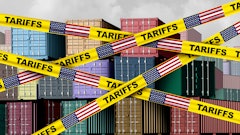
Small and mid-size business (SMB) confidence in the economy edged upwards in Q3, according to the latest CEO Confidence Index from Vistage, and while optimism has increased modestly, leaders remain cautious as they monitor the potential impact of policy changes on their businesses.
"CEOs are in a holding pattern, closely watching how trade, tariffs, taxes, and immigration policies unfold," says Joe Galvin, Vistage's chief research officer. "Uncertainty remains high, leaving leaders weighing whether to adopt an even more conservative approach or to begin accelerating their growth strategy. The economy is at a pivot point, and the decisions CEOs make now will shape the year ahead."
Key takeaways:
· The Index increased to 81.9 in Q3, up from 77.2 in Q2 and 78.5 in Q1.
· Navigating the economy and changing policies remained among the top concerns of SMB CEOs in Q3, but their focus has shifted subtly. While federal policy dominated worries in Q2, leaders are now expressing concerns about customers' increasingly cautious behavior and the subsequent slowing of the sales cycle.
· Meanwhile, hiring and retention have emerged as critical challenges, with businesses struggling to recruit skilled and leadership talent amid wage inflation, high turnover, and a weakened labor market. At the same time, tariffs and trade policies continue to disrupt supply chains, drive up costs, and delay projects, while rising material, labor, and interest costs put additional pressure on revenue growth.
- 62% of SMB CEOs report that tariffs have increased their costs.
- 43% have already raised prices, and 51% plan to raise prices in the next three months. Of those increasing prices, 64% plan hikes of 4-10%, while 10% plan increases of more than 10%.
- Tariffs are also impacting business performance: 36% report declining customer demand, 33% report revenue declines, and 46% report decreased profitability.
- 16% have decreased hiring in response to tariffs.
- 48% of SMB CEOs plan to increase headcount in the year ahead, up six percentage points from last quarter.
- 13% expect to reduce headcount over the next 12 months. This marks the third consecutive quarter where expectations for workforce reductions remain in double digits. The only time this number has been higher was during the height of pandemic uncertainty in Q2 2020, and during the 2008-2009 Great Recession.
- SMB CEOs are increasingly settling into stable workplace models: 43% report a hybrid workforce, 45% are fully onsite, and 8% are fully remote.
- When asked how they track employee engagement, respondents say:
- One-on-one meetings or manager check-ins (81%)
- Turnover or retention rates (61%)
- Employee engagement surveys (51%)
- Productivity or performance metrics (50%)
- Employee referrals or online reviews (22%)
- When asked what their focus areas are for employee engagement efforts, respondents say:
- Clear communication and leadership transparency (89%)
- Positive, values-driven culture (82%)
- Recognition and appreciation of employees (81%)
- Supportive managers and strong team relationships (71%)
- Career growth and development opportunities (68%)
- Work-life balance and flexibility (65%)
- SMB CEO optimism about what's next for their business is trending positively: 60% expect their sales revenues will improve during the next 12 months (up from 54% last quarter), and 48% anticipate their profitability will improve during that timeframe (up from 41% last quarter).


















